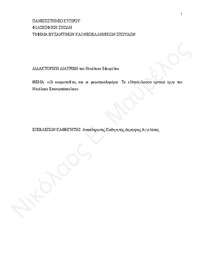Οι κοσμοπολίτες και οι φουστανελοφόροι: το ελληνόγλωσσο κριτικό έργο του Νικόλαου Επισκοπόπουλου

Date
2001-05Author
Μαυρέλος, ΝικολάοςAdvisor
Αγγελάτος, ΔημήτρηςPublisher
Πανεπιστήμιο Κύπρου, Φιλοσοφική Σχολή / University of Cyprus, Faculty of LettersPlace of publication
ΚύπροςCyprus
Google Scholar check
Keyword(s):
Metadata
Show full item recordAbstract
Η παρούσα διατριβή αποτελεί μια προσπάθεια παρουσίασης της λογοτεχνικής θεωρίας του κριτικού Νικόλαου Επισκοποπουλου, όπως διατυπώνεται στα άρθρα κριτικής που γράφει την εποχή που ζει στην Αθήνα και εργάζεται σε διάφορες εφημερίδες και περιοδικά, δηλαδή από το 1893 ως και το 1905. Τα έντυπα αυτά είναι οι εφημερίδες Άστυ, Νέον Άστυ και Εστία, και τα περιοδικά Ημερολόγιον Κ. Σκόκου, Η Τέχνη και Παναθήναια.
Στο πρώτο μέρος παρουσιάζονται οι απόψεις του για το λογοτεχνικό φαινόμενο καθαυτό, δηλαδή τα όρια της λογοτεχνίας και οι σχέσεις της με τα άλλα είδη λόγου, οι γενικότερες κατηγορίες και οι συγκεκριμένες ειδολογικές τους πραγματώσεις.
Στο δεύτερο μέρος δίνεται η σφαιρική άποψη που είχε για την εξέταση του λογοτεχνικού φαινομένου, δηλαδή η ένταξή του στα γενικότερα πνευματικά συμφραζόμενα και η επίδραση των εξωλογοτεχνικών παραγόντων σε αυτό. Η κατάληξη του δεύτερου μέρους είναι η αναφορά στην συγκριτολογική προοπτική του Επισκοποπουλου, για την οποία είναι απαραίτητη η προηγηθείσα προσέγγιση και στο λογοτεχνικό φαινόμενο καθαυτό (μέρος I) και στους εξωλογοτεχνικούς παράγοντες (κεφ. 1-5 του μέρους II). This work is the outcome of an effort to present the formation of N. Episkopopoulos theoretical view on the literary phenomenon. Nikolaos Episkopopoulos is a literary critic who lives in Athens and works as a literary critic for newspapers and reviews at the turn of the 19th century and the beginning of the 20th (1893-1905). The newspapers in which important literary criticism articles were published are Άστυ, Νέον Άστυ and Εστία, and the reviews Ημερολόγιον Κ. Σκόκου, Η Τέχνη and Παναθήναια.
The first part of the dissertation is a presentation of his views on literature itself, meaning the limits and the horizon of literature in comparison and contrast to that of the other speech genres and modes, its wide generical categories, its modes, its historical genres and their interaction.
The second part consists of the effort to highlight on the wide range of his theoretical view that could encompass and present the whole circle of the relations between literature and the World (writer, readers and all the non-literary factors that influence literature). The last chapter of this part is the presentation the comparative perspective of his criticism, a perspective attained only after the whole of his views (on literary and non-literary factors) is presented, for no comparative literary criticism can be achieved without a wide scope of the multiplicity of the literary phenomenon.
